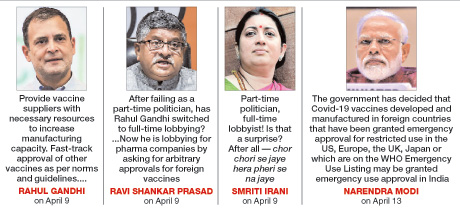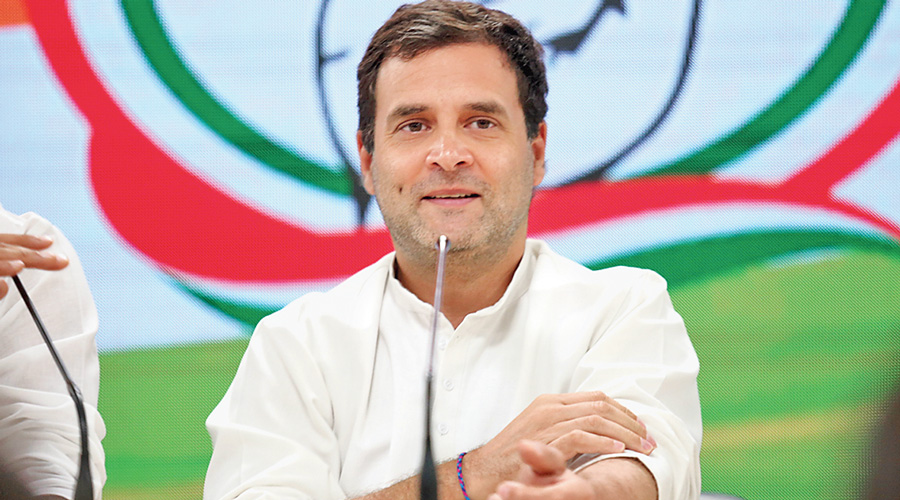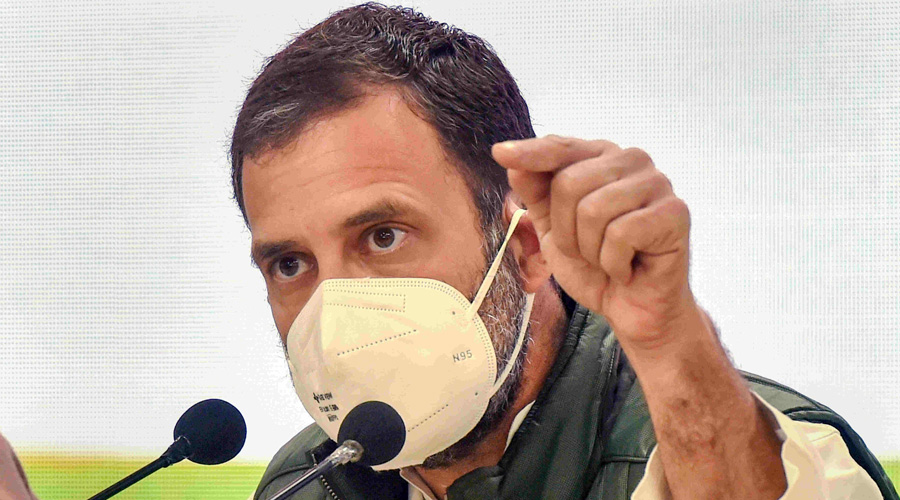Rahul Gandhi’s suggestion to allow Indians access to vaccines made abroad has been accepted by the Narendra Modi government, four days after he made it and at least two Union ministers responded by calling him names.
On Tuesday, the Centre decided that all vaccines developed and manufactured outside the country that have been granted emergency approval in the US, Europe, the UK, Japan or which are on the WHO Emergency Use Listing may be granted emergency use approval in India.
On April 9, Rahul had in a letter to the Prime Minister expressed concern at the slow pace of the vaccination drive in the country, pointing out that less than 1 per cent of the population had been fully vaccinated in three months.

“Provide vaccine suppliers with necessary resources to increase manufacturing capacity. Fast-track approval of other vaccines as per norms and guidelines. Open up vaccination to everyone who needs it,” the Congress leader wrote.
Law minister Ravi Shankar Prasad immediately pounced on Rahul, questioning his understanding as well as intention.
“After failing as a part-time politician, has Rahul Gandhi switched to full-time lobbying? First he lobbied for fighter plane companies by trying to derail India’s acquisition programme. Now he is lobbying for pharma companies by asking for arbitrary approvals for foreign vaccines,” Prasad tweeted.
It did not matter that Rahul had not asked for “arbitrary approval” of foreign vaccines but had in his letter to the Prime Minister specifically mentioned that approval should be granted “as per norms and guidelines”.
Lobbying for fighter planes is an unsubstantiated charge the BJP lobbed at the Congress leader after he relentlessly highlighted allegations of violation of laid-down procedures and corruption in the Rafale deal. Rahul had used the word “arbitrary” to describe Prime Minister Modi signing the Rafale deal during his visit to France.
Prasad also referred to Rahul’s allegation that India was facing vaccine starvation. “India is not facing vaccine starvation but Gandhi is facing attention starvation…. Rahul Gandhi’s problem is that he doesn’t understand all this and his ignorance is compounded by his arrogance,” the minister tweeted.
The tweets demonstrated a breakdown of systemic engagement between the government and the Opposition and the bitterness that overrides every communication between the two sides.
Women and child development minister Smriti Irani echoed Prasad. “Part-time politician, full-time lobbyist! Is that a surprise? After all — chor chori se jaye hera pheri se na jaye (A thief will do mischief come what may),” he tweeted, attaching Prasad’s tweet to her message.
On Tuesday, after the government decided to allow foreign vaccines, neither Prasad nor Irani explained whether the move was driven by a noble concern for people’s health care or whether lobbyists had had their way.
The government has not engaged in constructive dialogue with the Opposition on the pandemic and has been particularly harsh on Rahul, who has been cautioning about the gravity of the health and economic fallout since February last year.
Much like the early warning in 2020, which had earned him scorn from the government and the BJP, Rahul again sounded an alarm on February 17 this year. “The Government of India is being grossly negligent and overconfident about Covid-19. It is not over yet,” he wrote.
On February 21, the BJP passed a resolution thanking Modi for defeating Covid.
On March 15, Rahul tweeted: “As warned earlier, Covid-19 continues to be a big threat. Please keep the guards up — wear masks and follow all precautions.”
The country’s top politicians have been appearing without masks in public and leading huge electoral rallies where every Covid protocol has been flouted.
The country is now in the middle of a rampaging second wave, which threatens to overwhelm the health care system.
The Prime Minister did not appear to have foreseen this when he told the World Economic Forum’s Davos Dialogue on January 28: “India’s stats cannot be compared with any other country as 18 per cent of the world’s population lives here and yet we not only solved our problems but also helped the world fight the pandemic.”
He added: “In these tough times, India has been undertaking its global responsibility from the beginning. When airspace was closed in many countries, India took more than 1 lakh citizens to their countries and delivered essential medicines to more than 150 countries. Right now there are two made-in-India vaccines. The World Economic Forum will be relieved to know that in the time to come many more vaccines will come from India. These vaccines will enable other countries to speed up their vaccination process.”
Modi is now facing criticism for offering help to other countries without addressing India’s basic vaccination concerns.












